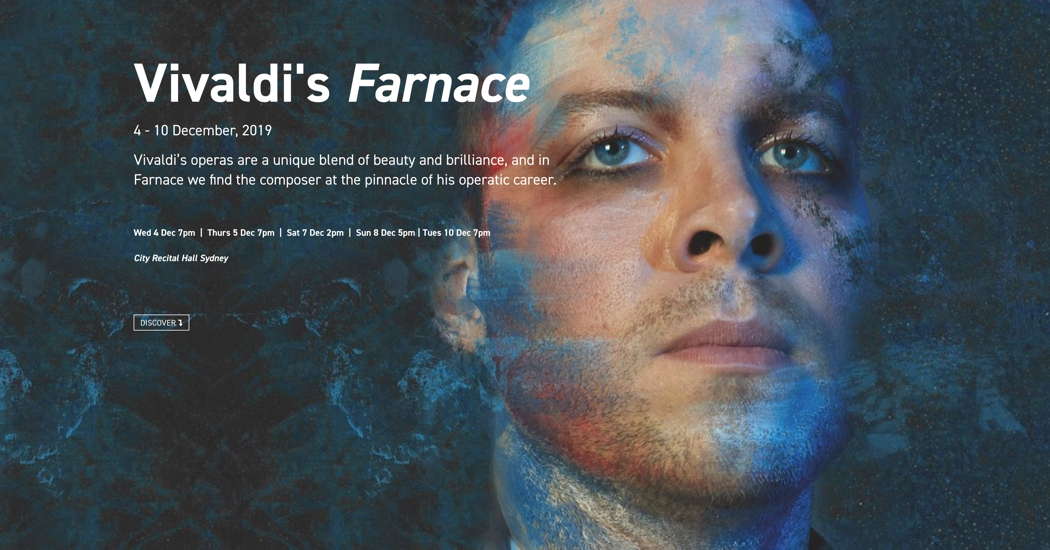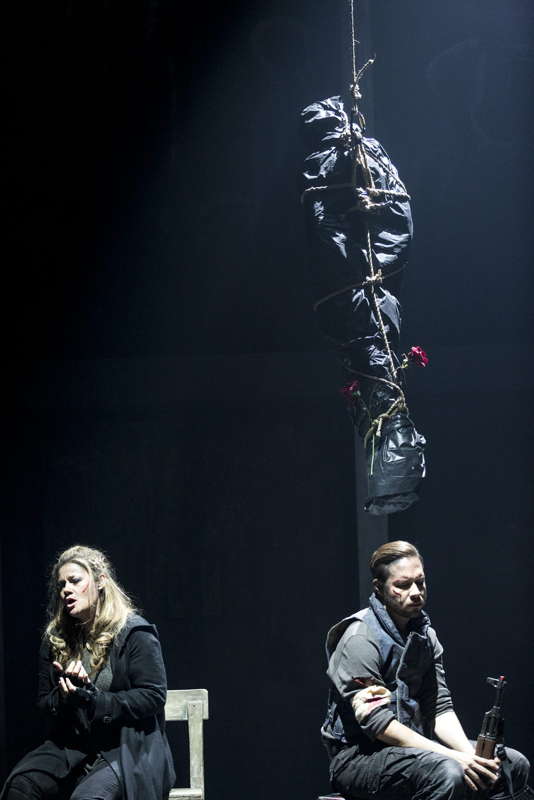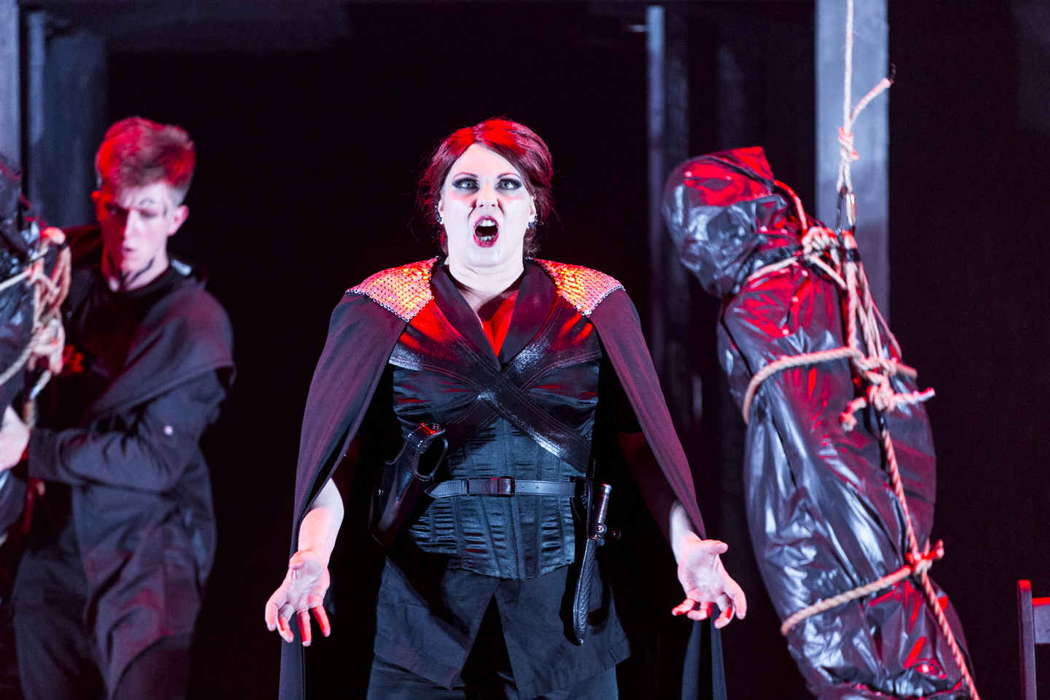 FEEDBACK: She said WHAT? Read what people think about our Classical Music Daily features, and have your say!
FEEDBACK: She said WHAT? Read what people think about our Classical Music Daily features, and have your say!
- Mícheál Ó Súilleabháin
- Erdem Misirlioglu
- Vox Productions Inc
- Niccolo Paganini
- Sergej Prokofjew
- John Eaton
- Victoria Bond
- Malcolm Forsyth
 DISCUSSION: What is a work? John Dante Prevedini leads a discussion about The performing artist as co-creator, including contributions from Halida Dinova, Yekaterina Lebedeva, Béla Hartmann, David Arditti and Stephen Francis Vasta.
DISCUSSION: What is a work? John Dante Prevedini leads a discussion about The performing artist as co-creator, including contributions from Halida Dinova, Yekaterina Lebedeva, Béla Hartmann, David Arditti and Stephen Francis Vasta.
Pearls on the Thread of Recitative
DAVID MITCHELL reviews
Pinchgut Opera's production
of Vivaldi's 'Farnace'
Pinchgut Opera is Australia's early music and Baroque opera company, specialising in performing less well known works in the repertoire. To close their 2019 season they presented Vivaldi's Farnace - the first time the opera has been staged in the southern hemisphere. First performed in 1717, Vivaldi constantly revised Farnace. In 1738 he was working on a new version for a festival in Ferrara, but the festival was cancelled. Vivaldi abandoned the score, having finished the first two acts but not the third. Pinchgut Opera has chosen to perform the incomplete 1738 version and Erin Helyard, Artistic Director of Pinchgut, has used arias from other Vivaldi works to provide a finished score.

Publicity for Pinchgut Opera's production of Vivaldi's Farnace
Farnace is about an ancient kingdom - Pontus - in turmoil. As the opera opens, Pontus has fallen to the Roman general Pompey (Timothy Reynolds). The king, Farnace (Christopher Lowrey), desperate that his family will not be enslaved by the Romans, orders Tamiri, his wife (Helen Sherman) to kill their young son and herself. In addition to the Romans, Farnace also has to deal with some internal threats. His mother-in-law Berenice (Jacqueline Dark) has allied herself with Pompey and seeks revenge against Farnace for his role in the death of her husband and son. Selinda (Taryn Fiebig), Farnace's sister, is captured by the invading force and is using her powers of seduction to try and help her brother. Despite this complicated web of vendettas and intrigue, the opera ends on a happy note, as was the convention for Baroque opera.
Director Mark Gaal uses a single set, a modern war zone with black plastic clad corpses hanging from the rafters on stage. The raising and lowering of the corpses is very effectively used to signal changes in place, time and mood.
In the final scene, for example, the corpses are winched down and laid on the stage. They are literally 'laid to rest' in the same way as the characters' hatred and thirst for revenge will be quickly put aside so the opera can finish on a happy note.
But at the beginning the contemporary staging is slightly off-putting and requires some tweaking of the surtitles to work. In the first scene, when Farnace orders his wife to commit suicide by burying 'this blade to the hilt' the surtitle translation substitutes 'bullet' for 'blade'. But after a few scenes, the costumes (combat uniforms with packs and automatic rifles) and sets, both designed by Isabel Hudson, and the lighting by Benjamin Brockman, effectively heighten the emotions being presented by the singing and music.
As Farnace, Christopher Lowrey's singing is beautiful. He has a lovely clear countertenor voice and his coloratura was sure. His recitative was emphatic and delivered with dramatic intensity. The role of Farnace swings between imperious demands, harsh vendettas and moving laments. But Lowrey's acting manages to suggest more complex emotions, including desperation in some of the earlier scenes. His stage presence was always arresting.

Helen Sherman as Tamiri and Christopher Lowrey
in the title role of Pinchgut Opera's
production of Vivaldi's Farnace.
Photo © 2019 Brett Boardman
Farnace gets the showstopper aria in the work. 'Gelido in ogni vena' has been recorded by mezzo sopranos - Cecilia Bartoli, Anna Bonitatibus, and Magdalena Kožená, among others - as well as star countertenors (Max Emanuel Cenčić). The aria is Farnace's anguished lament when he believes (erroneously) that his wife has followed his orders and killed their son. Lowrey's sustained and clear long notes, beautiful tone and sense of drama successfully conveyed the beauty of the piece and the intense pain felt by Farnace.
Although Farnace is the main character, it is the interactions of the trio of women that actually drives the plot: Farnace's mother-in-law Berenice, consumed by the need for revenge; Tamiri, Farnace's wife and the daughter of Berenice, torn between her husband's horrifying request and her mother's vitriol; and Selinda, Farnace's sister, working to stop Berenice from within the Roman camp. These roles are played by three of Australia's most accomplished singers.
Berenice is not a subtle character, and Australian mezzo soprano Jacqueline Dark does not play her as one. Dark dominates the stage in every scene she appears, whether demanding from Pompey Farnace's death, disowning her daughter, or calling for the death of her grandson. Dark seems to relish the character's perverse hard-heartedness and her voice easily handles all the vocal requirements of the role.

Jacqueline Dark as Berenice in Pinchgut Opera's production of Vivaldi's Farnace.
Photo © 2019 Brett Boardman
The other mezzo soprano role, Tamiri, is more substantial, although not necessarily more varied. Tamiri spends much of her time lamenting that she can't obey her husband's order, or pleading with her mother for a change of heart. But the role does have some of the most beautiful arias in the opera, and Helen Sherman's rich mezzo voice delivers some of the opera's most affecting moments. Two stand out. The aria 'Sento in seno ch'in pioggia di lagrime' (Act 2 Scene 9) is ravishing, as is the Act 3 aria 'Sol da te, mio dolce amore', accompanied by flute. (Helyard has used the music from Vivaldi's 'Orlando Furioso' for this aria.)
Selinda, played by soprano Taryn Fiebig, is a very different type of character. Her first words announce defiantly who she is and she is able to assert a much greater degree of control over her own fate than the other characters. When she is captured by the Romans, it is her plea for pity as well as her beauty that convinces Pompey to be merciful. Selinda then goes on to court one of the soldiers (Gilade) and pit another against him (Aquillo, played by Michael Petruccelli). Taryn Fiebig plays up Selinda's independence of spirit. Her recitative can be seductive and her bright soprano is able to portray coquetry in the early scenes and strong willed assertiveness in the later ones. The sweetness of her arias when courting Gilade make the later revelation of her scheming all the more surprising.
The surprise star of the evening was the newcomer, countertenor Max Riebl, who played Gilade. This was his first appearance with Pinchgut. He had wonderful command of his high notes and a crisp, clean tone. He received a spontaneous round of applause following his first aria, 'Nell'intimo del petto'.
The Orchestra of the Antipodes, led from the harpsichord by Erin Helyard, played with its usual brilliance and subtlety, moving easily from the lyrical to the energetic to the majestic, helped on this occasion by the addition of two horns. The playing was uniformly good, but the flute playing by Mikaela Oberg in 'Sol da te, mio dolce amore', was exquisite.
In Baroque opera, each aria is a pearl on the thread of recitative. Pinchgut Opera has provided a wonderful setting for Farnace. Top notch casting, evocative set design and costumes, beautiful orchestral playing and an imaginative completion of the score. All together this was able to release and enhance the emotional states of the arias in what is said to have been Vivildi's own favourite opera.
Copyright © 12 December 2019
David Mitchell,
Sydney, Australia



